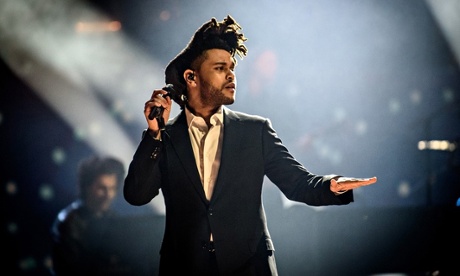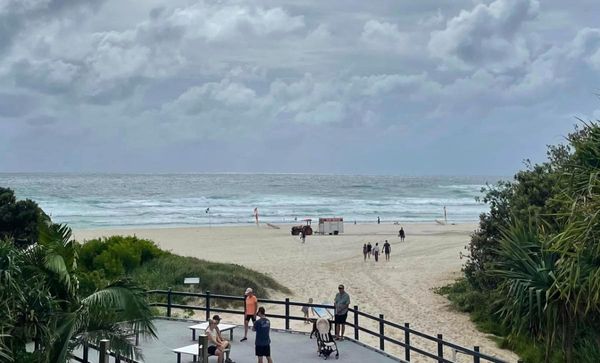
Beauty Behind The Madness is the fifth album from The Weeknd, if you count his three 2011 “mixtapes”, which you should, because they marked the arrival of a singular talent with a fully-formed vision and honed, heightened aesthetic sense.
The sound of those EPs – a radical form of new anti-soul music, a sort of anxious, anhedonic R&B – was fabulously, uniformly sombre. Meanwhile, the lyrics presented a mysterious figure lost in a high-class porn-style demimonde, all drugs and deceit, a twilit world full of casual sex, faithless women and men inured to pleasure. This was dark stuff from the murky depths of blog-land, disquieting to say the least. Initiation, from Echoes Of Silence, understandably made some listeners uncomfortable, with its allusion to the most extreme kind of crew love (“I got a test for you/You say you want my heart/Well, baby, you can have it all/There’s just something I need from you/Is to meet my boys”).
Well, that character, or the real person behind him anyway, Abel Tesfaye, now finds himself to be one of the biggest acts on the planet. It hasn’t been a blip-free ascent: Kiss Land, his studio debut, didn’t take The Weeknd to the next level on its release in 2013, although it hardly bombed either, entering the US Billboard charts at No 2. But his American successes of the last 12 months – Love Me Harder, a No 7 team-up with Ariana Grande; No 3 with Earned It from the 50 Shades Of Grey soundtrack; a Top 5 with The Hills; and a summer smash hit No 1 with Can’t Feel My Face – have catapulted him to a way higher, rarefied realm whereby The New York Times Magazine can legitimately ask: Can the Weeknd Turn Himself Into the Biggest Pop Star in the World?.
Beauty Behind The Madness is exciting because it finds the evidently troubled protagonist of The Weeknd’s music teetering on the brink of a fame that can only make him go to even more interesting places, emotionally speaking, even if what he ends up doing there might cause consternation and doubt. And it’s exciting because the music is just so good. The producers here include perennial sidekick Illangelo as well as Max Martin and Kanye West while the guests are Lana Del Rey, Ed Sheeran and Labrinth.
Opener Real Life is typical of the epic sorrow on offer, with surely the highest, saddest voice ever to come from a compulsive womaniser and near-sociopathic hedonist. The lyrics offer a rationale for his decadence, echoing the nihilism of his mixtapes: “Tell ‘em this boy wasn’t meant for lovin’… Mama called me destructive/Said it’d ruin me one day, yeah/Cause every woman that loved me, oh yeah/I seemed to push away.” In fact, Beauty Behind The Madness is a virtual concept album exploring Tesfaye’s shift towards fidelity and tentative embracing of love. It takes him a while to get there. On Losers the Toronto scion of a broken home who spent his teenage years living a low-rent version of the debauched existence portrayed in his music, justifies his disavowal of education and conventional society and lays out his ambitions (“Now we’re coming for the throne”). On Tell Your Friends, the warm Kanye production (based on a 1976 soul sample) contrasts with tales of drug and sex derring-do. But there is a sense of these as reminiscences. “I’m that nigga with the hair/Singing ‘bout popping pills, fucking bitches, living life so trill,” he declares. But it feels more like vainglorious mythologising, playing up to received ideas about him as a monster prowling the streets for easy prey.
Flashing between fantasy and grim reality, he describes the tawdry downside of success (his cousin asking him for a selfie at his grandmother’s funeral). There’s a recollection from his pre-fame days: “I was broken, I was broken, I was broke/I used to roam around the town when I was homeless.” The juxtaposition of now and then makes it clear: for all the trappings of success, he’s as unfulfilled as he ever was. Even the boasts on Often make all-night sex seem like a Sisyphean trudge, a point emphasised by the circular chord progression. By The Hills he reaches a crisis point, having an affair with a woman as duplicitous as him, and his admission that “when I’m fucked up, that’s the real me”, delivered in that aching peal, rings out like a cry for help. On Acquainted, he finally falls for someone, although whether Tesfaye was thinking of model Bella Hadid, who he was reported to be dating earlier this year, when he wrote it is moot. Then a moment of revelation, and a realisation that the only salve for his numb state is love: “Mama caught me cryin’, cryin’, cryin’/I won’t find somebody that’s real.” In the light of all this, Can’t Feel My Face, regarded widely as a paean to cocaine, seems more an expression of the euphoria that results from infatuation. Either way, it’s a fantastic pop song, an uptempo groove worthy of Michael Jackson at his shimmering peak. It’s the emotional epicentre of the album: a vertiginous high from which the only way is down, mood-wise. Shameless is lush spacious business as usual, with an almost prog guitar solo adding to the impression of this music as something-for-everyone - a latterday Thriller, with the potential to appeal to R&B and rock fans.
Earned It is a sumptuous beat ballad worthy of an R&B John Barry, all shivering strings and a declaration from Tesfaye that he’s found someone he cares for. In The Night – the one they’re talking up as the new Billie Jean – is the other uptempo track on the album. It’s a ravishing pop song, notwithstanding the lyric about a stripper, but then again Billie Jean was about an unwanted pregnancy and that reached No 1 across the universe. As In You shows how far The Weeknd character has come, stammering because he can scarcely believe it himself: “Show me your broken heart and all your flaws/Baby I’ll take, I’ll take, I’ll take, I’ll take you as you are.” The Sheeran collaboration Dark Times, a blues lament in which the ginger troubadour makes an unconvincing bloody and bruised barfly, feels anomalous before we finally meet Tesfaye’s match: the woman he’s been singing about, played by Lana Del Rey on Prisoner. It’s hardly Mills & Boon, but for The Weeknd and his dead-eyed paramour it’s probably as close as we’ll get to happy ever after: “I’m a prisoner to my addiction,” they sing in unison, preparing to head off hand in hand. “I’m addicted to a life that’s so empty and cold.” It’s Hollywood, via Hell. The pair don’t quite disappear into the sunset. In fact, Prisoner, tragically, marks the end of their affair. Angel is the ambiguous closer: is he letting go this perfect woman, who “always seem[s] to bring the light”, because she deserves someone better, or because he doesn’t consider himself worthy? Maybe it’s because he knows there’s no future for a satisfied Weeknd.
Certainly no one does stark melancholia like Tesfaye. Beauty Behind The Madness is 65 minutes of bleak, brooding beauty addressing the impossibility of relationships. It’s bound to resonate powerfully with his flighty twenty-something audience, but even those who don’t recognise the crepuscular netherworld he portrays in his music can’t fail to be seduced by its gothic-glossy surfaces and air of glamorous gloom. It confirms The Weeknd not just as the leading purveyor of solemn slow jams but as a fascinating rock star who has turned a dissection of hope and despair into one of the most compulsive albums of the year.







